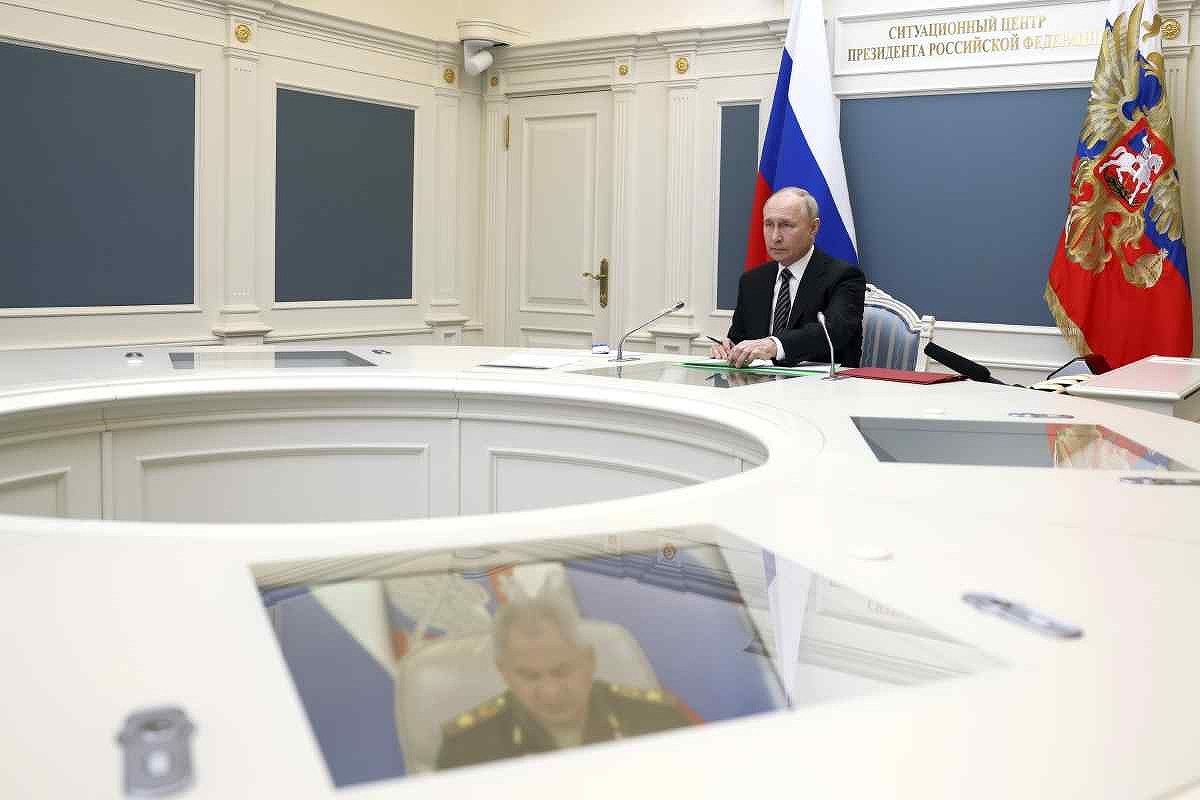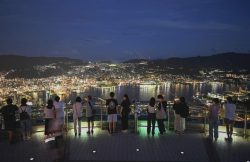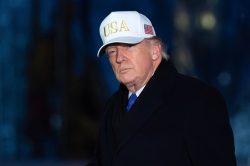Russian Forces simulate Nuclear Strike as Upper House Rescinds Ratification of Test Ban Treaty

Russian President Vladimir Putin conducts training with the forces and means of the ground, sea and air components of the nuclear deterrent forces in Moscow on Wednesday.
11:40 JST, October 26, 2023
MOSCOW (AP) — Russia’s military conducted a simulated nuclear strike in a drill Wednesday overseen by President Vladimir Putin, hours after the upper house of parliament voted to rescind the country’s ratification of a global nuclear test ban.
The bill to end ratification of the Comprehensive Nuclear Test Ban Treaty, approved in the lower house last week, will now be sent to Putin for final approval. Putin has said that revoking Russia’s 2000 ratification would “mirror” the stance of the U.S., which signed but did not ratify the nuclear test ban.
State television showed Putin directing the exercise via video call with top military officials.
Russia’s Minister of Defense Sergei Shoigu said the purpose of the drills is to practice “dealing a massive nuclear strike with strategic offensive forces in response to a nuclear strike by the enemy.”
While similar drills are held every autumn, Shoigu’s pointed comments came amid soaring tensions between Russia and the West over the fighting in Ukraine.
The test ban treaty, adopted in 1996, bans all nuclear explosions anywhere in the world, but the treaty was never fully implemented. In addition to the U.S., it is yet to be ratified by China, India, Pakistan, North Korea, Israel, Iran and Egypt.
There are widespread concerns that Russia could move to resume nuclear tests to try to discourage the West from continuing to offer military support to Ukraine. Many Russian hawks have spoken in favor of a resumption of the tests.
Putin has noted that while some experts have argued that it’s necessary to conduct nuclear tests, he hasn’t yet formed an opinion on the issue.
Russia’s Deputy Foreign Minister Sergei Ryabkov said earlier this month that Moscow will continue to respect the ban and will only resume nuclear tests if Washington does it first.
Ryabkov said Wednesday that the Russian Foreign Ministry had received U.S. proposals to resume a dialogue on strategic stability and arms control issues, but noted that Moscow doesn’t consider it possible in the current political environment.
We aren’t ready for it because the return to a dialogue on strategic stability … as it was conducted in the past is impossible until the U.S. revises its deeply hostile policy course in relation to Russia, Ryabkov told reporters in comments carried by Russian news agencies.
Top Articles in News Services
-

Arctic Sees Unprecedented Heat as Climate Impacts Cascade
-

Prudential Life Expected to Face Inspection over Fraud
-

South Korea Prosecutor Seeks Death Penalty for Ex-President Yoon over Martial Law (Update)
-

Trump Names Former Federal Reserve Governor Warsh as the Next Fed Chair, Replacing Powell
-

Japan’s Nagasaki, Okinawa Make N.Y. Times’ 52 Places to Go in 2026
JN ACCESS RANKING
-

Univ. in Japan, Tokyo-Based Startup to Develop Satellite for Disaster Prevention Measures, Bears
-

JAL, ANA Cancel Flights During 3-day Holiday Weekend due to Blizzard
-

China Confirmed to Be Operating Drilling Vessel Near Japan-China Median Line
-

China Eyes Rare Earth Foothold in Malaysia to Maintain Dominance, Counter Japan, U.S.
-

Japan Institute to Use Domestic Commercial Optical Lattice Clock to Set Japan Standard Time


























